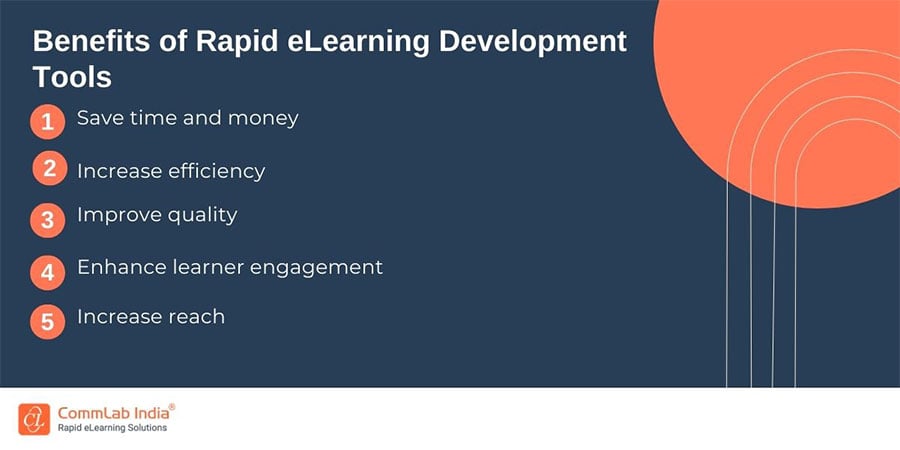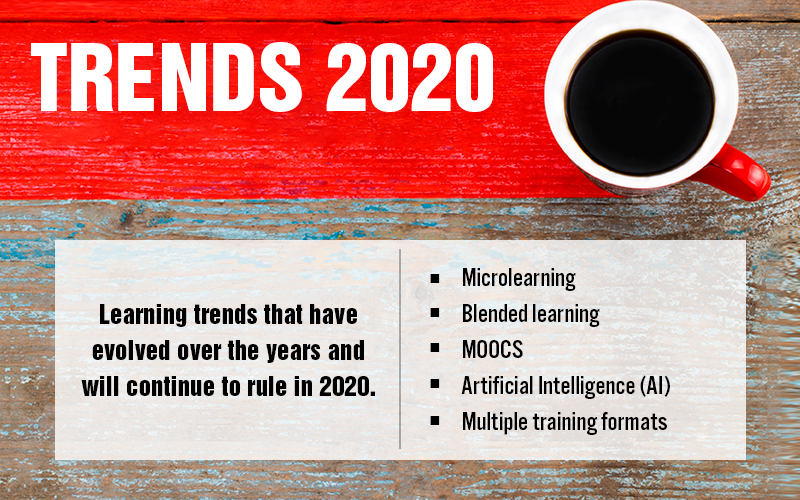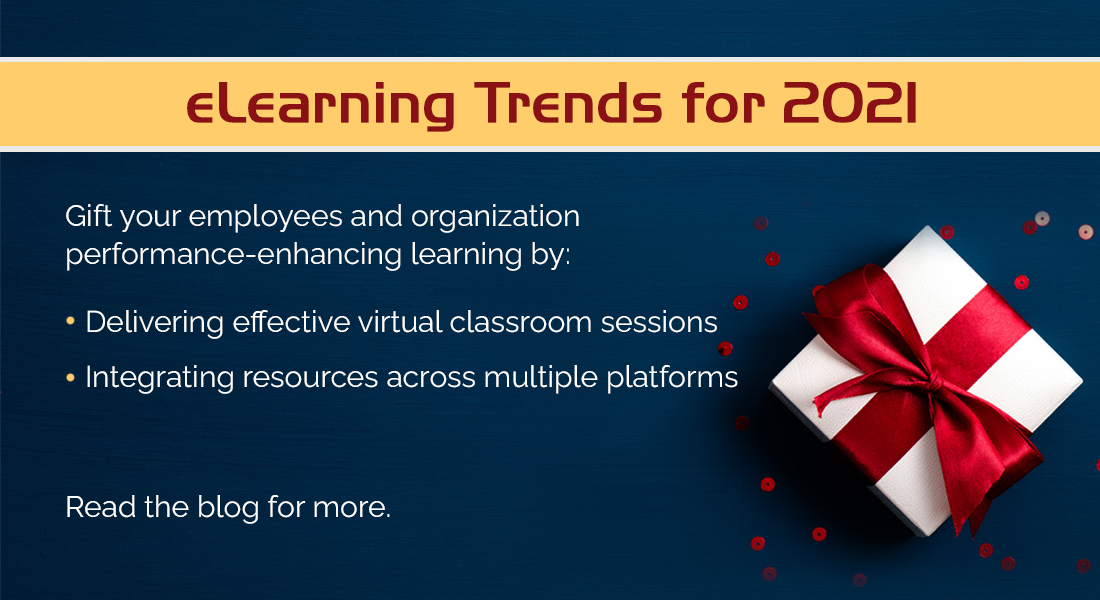Future Trends in Rapid eLearning Development Tools: What to Expect

Want to revolutionize the way we learn and develop eLearning content for corporate training? Use of the best rapid eLearning development tools is the key! And as the field of Learning and Development (L&D) continues to evolve, rapid eLearning development tools too have gained significant popularity among L&D managers – all thanks to their ability to create engaging and effective online courses quickly. However, the landscape is constantly changing, and it’s important for L&D managers to stay ahead of the curve.
Are you an L&D manager who acknowledges the importance of the best rapid eLearning development tools and wants to stay updated with the trends associated with these tools? This blog’s your guide!
In this blog post, we will explore the future trends in rapid eLearning development tools and provide insights into what to expect in the coming years. We will also discuss key considerations when choosing the best rapid eLearning development tool…
How Can L&D Managers Choose the Best eLearning Development Tool for Their Needs?
Here are the factors to consider:
- Define your goals.
- Research your options.
- Consider your budget.
- Get input from others.
Rapid eLearning Development Tools
Rapid eLearning development tools are software applications/tools that facilitate the development of online learning materials quickly and easily. They are designed to simplify the process of developing interactive eLearning content. These tools facilitate eLearning course development by allowing instructional designers (IDs ) and subject matter experts (SMEs) to create engaging and effective courses without extensive programming knowledge or expertise.
There are several benefits of using rapid eLearning development tools, lets discuss them:
Benefits of Using Rapid eLearning Development Tools
As the name suggests, rapid eLearning development tools are designed to help you create eLearning courses quickly and easily. There are many benefits to using these tools, including:

- Save time and money: Rapid eLearning tools can help you save time and money by allowing you to develop eLearning courses quickly and easily. You won’t need to hire expensive developers or designers, and you can create courses in a fraction of the time it would take to develop them from scratch.
- Increase efficiency: Rapid eLearning tools can help you increase your efficiency by automating some of the course development process. This means you can spend less time on administrative tasks, and more time on creating high-quality content.
- Improve quality: Rapid eLearning tools can also help improve the quality of your courses by providing templates and other resources that can help you create professional-looking courses quickly and easily.
- Enhance learner engagement: By using rapid eLearning tools, you can enhance learner engagement by adding interactivity and other features that will keep learners engaged with your content.
- Increase reach: Rapid eLearning tools can also help you increase the reach of your courses by making them available online for anyone to access. This makes it easy for learners to take your courses from anywhere in the world, at any time.
→ Download Now: Training Manager’s Guide to Rapid eLearning Development
Current State of the Market for Rapid eLearning Tools
The current state of the market for rapid eLearning tools can be described as robust and growing. There are a number of companies that offer rapid eLearning solutions, and the competition among them is strong. This is good news for organizations, as it means that there are a number of options to choose from and that prices are competitive.
Rapid eLearning development tools have come a long way in recent years, and the trend is towards more user-friendly and intuitive solutions. This is good news for those who want to develop their own eLearning courses, as it makes the process easier and faster. In addition, many of these tools now offer a wide range of numerous characteristics and functions, making it possible to create highly customized and effective eLearning courses.
The future of rapid eLearning looks very promising. As the demand for eLearning continues to grow, so too will the market for rapid eLearning tools.

There are several factors ad trends fueling this growth including:
- The rise of authoring tool suites: Authoring tool suites offer a one-stop solution for creating eLearning content, including courses, quizzes, and assessments. These suites provide a more comprehensive and efficient workflow than using multiple individual tools.
- Increased use of artificial intelligence (AI) and machine learning (ML): AI and ML are being used more frequently in rapid eLearning development tools to create personalized learning experiences and improve content quality.
- Gamification of learning content: Gamification is a popular trend in eLearning, and it is being increasingly used in rapid eLearning development tools to make learning more engaging and fun.
- Virtual reality (VR) and augmented reality (AR) integration: VR and AR are being used more frequently in rapid eLearning development tools to create immersive learning experiences.
Based on these expectations, we can also have draw the future expectations from the best rapid eLearning development tools –
Features and Innovations Expected in Rapid eLearning Development Tools
- A focus on mobile learning: With the increasing popularity of mobile devices, it is likely that future versions of rapid eLearning development tools will place a greater emphasis on creating mobile learning content that can be accessed and consumed on these devices.
- An increase in the use of artificial intelligence (AI): AI technology is becoming increasingly sophisticated and it is likely that this trend will continue in the realm of rapid eLearning development tools. This could lead to the inclusion of features such as automatic question generation and adaptive course content.
- A move towards more open-source solutions: There is a growing trend towards open-source software in the eLearning industry and this is likely to extend to rapid eLearning development tools in the future. This could result in increased flexibility and customizability for users as well as lower costs.
How Can L&D Managers Choose the Best eLearning Development Tool for Their Needs?
As the field of L&D evolves, so too do the tools available to managers. With so many options on the market, it can be difficult to choose the right one for your needs. Here are some tips to help you select the best rapid eLearning development tool for your organization:
- Define your goals. What are you hoping to achieve with this tool? Do you want to create engaging, interactive content? Are you looking for a way to save time and money on development? Be clear about what you want to accomplish before beginning your search.
- Research your options. Once you know what you’re looking for, take some time to research the different options available. Read reviews, compare features, and get pricing information.
- Consider your budget. Don’t forget to factor in cost when making your decision. Some tools are more expensive than others, but that doesn’t necessarily mean they’re better suited for your needs. Determine what you’re willing to spend before narrowing down your choices.
- Get input from others. If possible, consult with other L&D professionals or those who will be using the tool before making a final decision. They may have insights or recommendations that can help guide your decision-making process.
Know more about rapid eLearning development for corporate training
Summing Up
Rapid eLearning development tools are always evolving to meet the needs of modern learners and organizations. In the near future, expect to see more advanced features such as AI-assisted content creation, integration with virtual reality platforms, and analytics capabilities that will provide insights into how your courses are performing.
But before zeroing on the best rapid eLearning development tool, it is also important that you have a very good understanding of the rapid eLearning development process and this eBook can help you…





